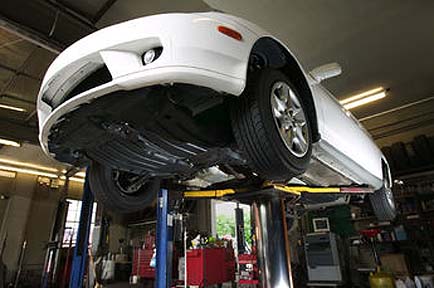|
The Envoironmental Impact of Re-Refining Used Motor Oil including the status of recycled oil in the US can be accessed by clicking here.
 Motor oil is a unique substance. You can abuse it at high temperatures for months in car and truck engines and it can then be collected and re-refined to its previous purity. Motor oil is a unique substance. You can abuse it at high temperatures for months in car and truck engines and it can then be collected and re-refined to its previous purity.
Fact: you can clean used oil through re-refining and re-use it indefinitely. Though a percentage is lost every time it is used, motor oil can be cleaned and re-used virtually forever. Every quart of motor oil that is re-used is a quart of oil that doesn’t have to acquired from overseas – often from people that don’t particularly care for Americans.
Motor oil that is discarded on the ground or burned is lost forever. Thankfully, most Americans have become environmentally responsible by getting their used motor oil (UMO) to a recycling center – both due to recent federally mandated regulations as well as the proliferation of easy oil-changes.
What happens when UMO goes to the recycling center? For example, when you take your car to almost any commercial establishment in the US to get your oil changed, UMO is collected for recycling. It's a feeling of satisfaction, especially for those who changed their own motor oil earlier in life when there weren't very many outlets for recycling it.
 Now one might conclude that the recycler is cleaning the UMO, re-refining it and returning it for use in automobiles – but not so. Only a small percentage is every re-refined. A much larger percentage is delivered to industries that burn it for fuel. Quite a large number of ocean-going ships burn UMO for fuel. The ships call it “bunker fuel”. Now one might conclude that the recycler is cleaning the UMO, re-refining it and returning it for use in automobiles – but not so. Only a small percentage is every re-refined. A much larger percentage is delivered to industries that burn it for fuel. Quite a large number of ocean-going ships burn UMO for fuel. The ships call it “bunker fuel”.
Bunker fuel burned by ships is 1,000 times dirtier than highway diesel used by trucks and buses. Remember those pictures of Kuwait on fire in the first gulf war? Well that kind of pollution is pouring out of the ships smokestacks. Click here for more information.
- A single cruise liner or cargo ship can emit as much pollution as 350,000 cars.
- The majority of the world's ocean going commercial shipping fleets – approximately 90,000 ships – are responsible for a sixth of all worldwide nitrogen oxide pollution. They are pumping incredible amounts of sulfur into our atmosphere.
- Many ports require ships to sail miles offshore before the ships begin burning this dirty fuel. While that may make it better to breathe in those port cities the same pollutants are still being pumped out into the atmosphere at sea.
- If all recovered UMO were recycled it would represent 19.6 million bbls of oil/yr; equivalent to more than 1 full day's consumption in the US.
- All the UMO in the US could be re-refined with the construction of approximately 30 re-refineries at a cost of nearly $1.8 billion (estimate).
 It is immediately apparent that no single re-refinery can do what is needed to combat the pollution of the earth’s atmosphere by the burning and destruction of UMO. Therefore a much larger scale approach is required by the US government and the governments of the world. Since a great majority of the world’s fleet docks in US ports on their sojourns, this could be addressed through immediate action. If ships were not allowed to fill up their bunker tanks with UMO while in American ports, it would decrease the loss of this precious substance by a sizable percentage. It would also decrease the world’s pollution by a noticeable amount. It is immediately apparent that no single re-refinery can do what is needed to combat the pollution of the earth’s atmosphere by the burning and destruction of UMO. Therefore a much larger scale approach is required by the US government and the governments of the world. Since a great majority of the world’s fleet docks in US ports on their sojourns, this could be addressed through immediate action. If ships were not allowed to fill up their bunker tanks with UMO while in American ports, it would decrease the loss of this precious substance by a sizable percentage. It would also decrease the world’s pollution by a noticeable amount.
Ironically, consider this: millions of people driving their cars out of Jiffy Lube, Grease Monkey, etc. believe that they have recycled their motor oil when in fact they have just destroyed the very same oil that came out of their car, causing even greater pollution by its burning as bunker fuel.
|








 Motor oil is a unique substance. You can abuse it at high temperatures for months in car and truck engines and it can then be collected and re-refined to its previous purity.
Motor oil is a unique substance. You can abuse it at high temperatures for months in car and truck engines and it can then be collected and re-refined to its previous purity. Now one might conclude that the recycler is cleaning the UMO, re-refining it and returning it for use in automobiles – but not so. Only a small percentage is every re-refined. A much larger percentage is delivered to industries that burn it for fuel. Quite a large number of ocean-going ships burn UMO for fuel. The ships call it “bunker fuel”.
Now one might conclude that the recycler is cleaning the UMO, re-refining it and returning it for use in automobiles – but not so. Only a small percentage is every re-refined. A much larger percentage is delivered to industries that burn it for fuel. Quite a large number of ocean-going ships burn UMO for fuel. The ships call it “bunker fuel”. It is immediately apparent that no single re-refinery can do what is needed to combat the pollution of the earth’s atmosphere by the burning and destruction of UMO. Therefore a much larger scale approach is required by the US government and the governments of the world. Since a great majority of the world’s fleet docks in US ports on their sojourns, this could be addressed through immediate action. If ships were not allowed to fill up their bunker tanks with UMO while in American ports, it would decrease the loss of this precious substance by a sizable percentage. It would also decrease the world’s pollution by a noticeable amount.
It is immediately apparent that no single re-refinery can do what is needed to combat the pollution of the earth’s atmosphere by the burning and destruction of UMO. Therefore a much larger scale approach is required by the US government and the governments of the world. Since a great majority of the world’s fleet docks in US ports on their sojourns, this could be addressed through immediate action. If ships were not allowed to fill up their bunker tanks with UMO while in American ports, it would decrease the loss of this precious substance by a sizable percentage. It would also decrease the world’s pollution by a noticeable amount.